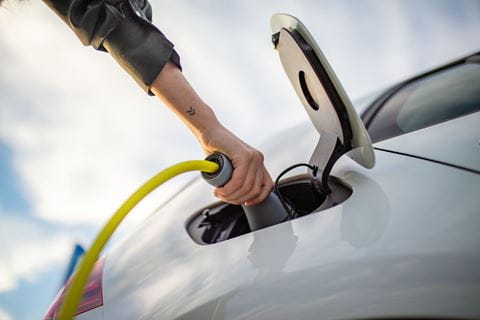.jpg?iar=0&rev=817dc32e8771430e868a9994d20f07e3&mw=480&io=transform%3Afill%2Cwidth%3A480)
The benefits of electric driving

Better for you and the planet
All over the world, electric cars are becoming unavoidable. They are good for the environment throughout their life cycle and have many benefits for you as a driver. If you're thinking about going electric, here are a few more reasons to do so.

Durability
Electric cars help improve air quality because they emit less CO2 than petrol or diesel cars. Many countries are already working on developing stricter emissions regulations in order to achieve the European Union's goal of climate neutrality by 2050. By opting for an electric car now, you're getting a head start. Even if you don't just use renewable electricity to charge throughout your life cycle, it's still more sustainable than a similar car with a combustion engine.

State-of-the-art technology
The latest generation of electric cars offer real-world ranges of more than 500 km on a charge, and more and more charging stations are emerging. With electricity currently the cheapest fuel, charging an electric car is cheaper than filling up with petrol or diesel. In addition, electric motors require less maintenance: another advantage that saves time and money. The power of the engine is usually higher than that of a similar car with a combustion engine, and this power is also available immediately, which guarantees more dynamic driving pleasure with complete peace of mind.

More and more electric models
Fully electric cars are becoming more accessible and affordable, thanks to innovations from innovative companies such as Tesla, but also in established car brands such as Audi, BMW, Mercedes, Volkswagen and Nissan. Charging infrastructure and technology are also constantly developing and improving, and the charging network in North America, Europe, and China, in particular, has grown exponentially over the past few years. With falling costs, the deluge of new makes and models, and less range anxiety with the construction of each new charging station, it's never been easier or more attractive to drive electric.

Legislative changes in sight
In order to accelerate the EV revolution, new electric vehicle legislation has been introduced. In June 2022, a vote in the European Parliament mandated that all new cars and vans sold in the European Union be zero-emission vehicles by 2035. Manufacturers will no longer be allowed to sell new cars or light commercial vehicles with internal combustion engines. By 2030, the EU will aim to put at least 30 million electric vehicles on the road. More and more cities are implementing Low Emission Zones (LEZs) in order to improve air quality for residents. More than 200 cities in Europe already have Low Emission Zone policies in place, and this number will continue to grow.

Beneficial for your fleet
Since EVs do not produce direct emissions, companies can make significant progress in achieving their sustainability goals by adopting an EV fleet. And as more and more EVs hit the market every year, running costs are decreasing. In addition, EV maintenance costs are significantly reduced. It's also important to mention that to cater to the growing number of EVs on the road, EV charging infrastructure is growing rapidly. In addition, electric vehicles benefit from many significant tax advantages!
Low Emission Zones
LEZ - Low Emission Zones
The great attraction of an electric vehicle lies in the fact that it allows you to drive without producing polluting emissions. As you move, the EV system is a "closed loop," meaning the battery drives the electric motor and powers all onboard electrical devices, but produces no waste.
This is great news for EV drivers. What for? Because you can still access the low-emission zones. (LEZ or ZFE)
This is not yet the case in Luxembourg, but in many cities in our neighbouring countries. These cities keep internal combustion engine cars away from their center because of the harmful air pollution they cause. More than 200 cities, including London, Amsterdam, Stuttgart and Stockholm, have already implemented low-emission zones. The most polluting combustion engine cars are also banned in Brussels, Antwerp and Ghent. With electric cars, you continue to have access to low-emission zones.
